First aid for bites and stings
Serious allergic reactions occur in approximately 2 per cent of stings from ants, bees and wasps. Symptoms such as swelling of the face, lips and tongue, breathing difficulties or a generalised rash are potentially life-threatening and require urgent medical attention.
Insects
Bee stings
Remove the sting by scraping, never squeeze the site. Wash the area and apply antiseptic cream. Keep the sting site rested, elevated and cool. Local swelling and irritation may last for several days.
Wasp and hornet stings
These do not leave a sting behind. Treat the area as for bee stings.
Ant and other insect bites
Treat as for bee stings.
Scorpions
Scorpion stings can be very painful and the pain may persist for several hours. Local redness and numbness often occur. Wash the sting site; apply antiseptic and apply a cool pack. Give pain killers such as paracetamol. Australian scorpions do not cause severe symptoms.
Centipedes
Apply antiseptic to the bite site. Local redness, itching and pain are common. Severe pain is sometimes experienced.
Fire ant stings
Apply a cold compress to relieve the swelling and pain. Wash the affected area with soap and water. Immediately seek medical attention if you are allergic to insect stings or have symptoms of allergy. Read more about fire ant stings.
Spiders
Red-back spider (Lactrodectus)
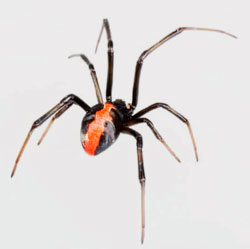
Red-back spider
Wash the bite site, apply antiseptic and a cool pack. In the majority of cases only minor pain and redness occur. In 25 per cent of cases, severe pain and other symptoms such as sweating, headache, vomiting and muscle pain develop over the first few hours. Take the victim to hospital if there are severe symptoms.
White-tailed spider (Lampona)
There is no clear scientific evidence that bites from these spiders cause skin ulceration. Treat as for bites from all other spiders.
Spiders – all other
Wash the bite site, apply antiseptic and see your doctor if signs of local infection develop.
(This information only applies to the regions of South Australia, Western Australia and the Northern Territory.)
Marine
Jellyfish (non-tropical)
Apply vinegar or Stingose then shower in hot water for at least 15 minutes.
Blue-ringed octopus
Muscle paralysis with breathing difficulties can occur within minutes of the bite. The bite may not be painful. Apply a pressure immobilisation bandage, perform mouth to mouth resuscitation as required and seek urgent medical help.
Fish stings
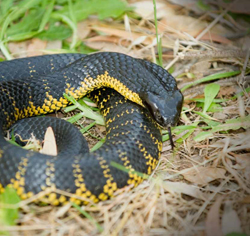
Western tiger snake
Immerse the sting site in hot water (as hot as can be tolerated for at least 30 minutes). Get medical help for severe pain or if the pain is not relieved by the hot water.
Snake bites
Treat all bites, including suspected bites, as potentially life threatening. Get urgent medical/ambulance assistance. Phone 000 for an ambulance.
- Do not wash, squeeze or puncture the bite site.
- Apply a pressure immobilisation bandage.
- Keep the victim calm and still.
- Do not give food or alcohol.
- Do not allow the victim to walk.
- Bites to the head and body must be bandaged as firmly as possible.
Do not attempt to catch or kill the snake.
Bandaging a bitten leg
- Apply a broad pressure bandage from below upwards and over the bite site as soon as possible. Do not remove trousers, as the movement of doing so will assist venom to enter blood stream.
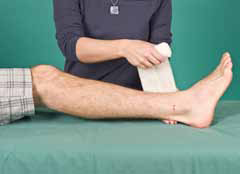
- The bandage should be as tight as you would apply to a sprained ankle. The patient should avoid any unnecessary movements.
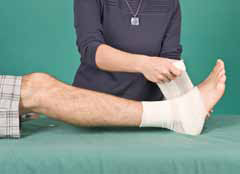
- Extend the bandage as high as possible.
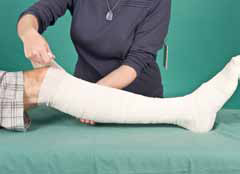
- Apply a splint to the leg, immobilising joints either side of the bite.
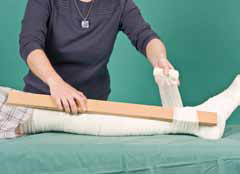
- Bind it firmly to as much of the leg as possible.
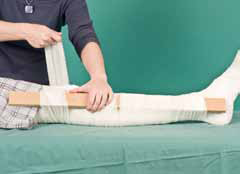
This bandaging technique should also be used for blue-ringed octopus bites.
Where to get help
For a snake bite, or if the victim has collapsed or has stopped breathing, do not delay, phone 000 for an ambulance.
Call the Poisons Information Centre on 13 11 26 (24 hours a day).
Acknowledgements
WA Poisons Information Centre
This publication is provided for education and information purposes only. It is not a substitute for professional medical care. Information about a therapy, service, product or treatment does not imply endorsement and is not intended to replace advice from your healthcare professional. Readers should note that over time currency and completeness of the information may change. All users should seek advice from a qualified healthcare professional for a diagnosis and answers to their medical questions.